The City: Where workers get a vote for the council
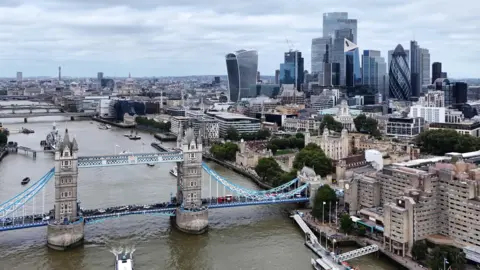 EPA
EPAThe City of London has remained an oddity within the English system of local government, having escaped reform over the centuries unlike every other city and borough in England.
The reason why is the Liberties and Customs of the City which were guaranteed by the Magna Carta, the charter of rights agreed to by King John at Runnymede in 1215, and have been jealously guarded ever since.
As a result the City of London has its own way of working - so here's our guide to the role livery companies, aldermen and common councillors have, along with the additional rights offered to workers in the so-called Square Mile.
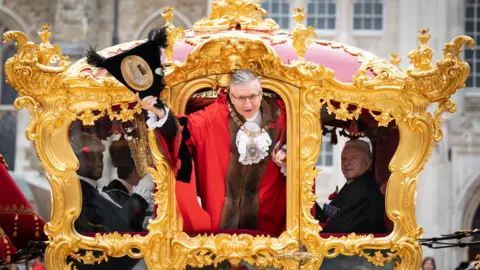 PA Media
PA MediaNon-residential votes in other council areas were abolished in 1969 but the system continued for the City.
The local council - more correctly called the Court of Common Council - consists of 100 common councillors and 25 aldermen.
The 25 wards have characterful names such as Cripplegate Without, and Cripplegate Within, Vintry, Queenhithe and Bread Street.
Between two and 10 councillors are elected to represent each City ward, depending on the size of the electorate. They are elected for four-year terms.
Each ward also has an alderman, elected for six years. The Lord Mayor is chosen from the aldermen for a year-long term.
Then there are the beadles - elected officers in each ward whose job involves opening, closing and keeping order at the wardmote, a Saxon word meaning a meeting of the ward.
This might seem a lot of representatives for the smallest local government area in the country, with an estimated resident population of 6,800 people.
But there are more than 650,000 people who work in the City of London but don't live there, and some of them also get to vote.
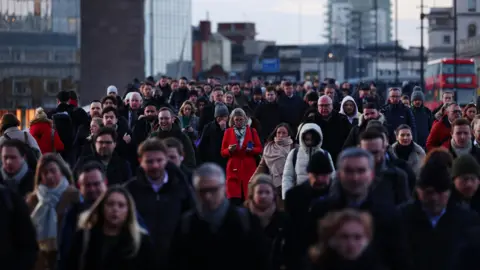 EPA
EPAEach company that has offices within the Square Mile of the City can appoint voters using a formula based on the number of employees they have working in those offices.
Organisations with a workforce of nine or less can appoint one voter, those with up to 50 can appoint one voter for every five, and those with more than 50 can appoint 10 voters and one additional voter for every 50 members of the workforce.
If organisations occupy more than one office in the City, each office has the right to appoint a voter or voters.
It does not matter if those offices are in the same ward but they must not be "physically linked", according to the guidance on the City of London website.
The allocated voters must work in the offices concerned.
The companies are responsible for appointing their voters as they see fit, but there is a secret ballot.
They can vote in person at a polling station within their ward or by postal vote.
A voter can vote in the City as well as at their home address, provided they do not also live in the City.
Data from 2024 found there were more than 13,700 corporate voters and around 6,500 resident voters.
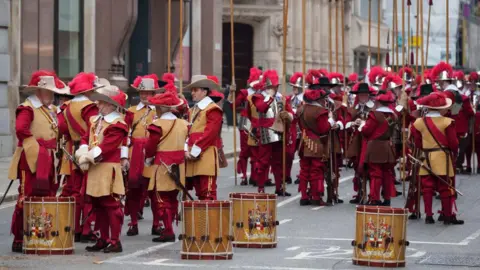 Getty Images
Getty ImagesThere is an additional requirement to be elected to the Court of Common Council - you have to have the Freedom of the City of London - the only council in the UK with this rule.
The language used about this Freedom reflects its medieval origins: the City of London website says there are "several ways to apply for the Freedom: by servitude, by patrimony, by nomination or by presentation via a livery company".
There are currently 113 livery companies, a type of guild or professional association of London's ancient and modern trades.
Many have names of crafts lost to history, such as horners (someone who works or deals in animal horns), tallow chandlers (candle makers and sellers who make candles out of animal fat) and paviors (people who lay pavements).
The oldest is the Worshipful Company of Mercers, or general merchants, which was granted livery status in 1394.
The newest is the Worshipful Company of Communicators which gained its status earlier this year.
Ancient traditions associated with livery companies include the right of liverymen and women to elect the City Sheriffs and the Lord Mayor.
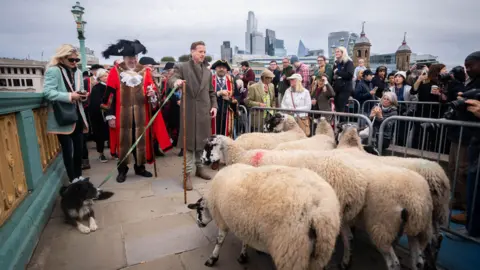 PA Media
PA MediaThere are other ways apart from membership of the livery companies to attain the Freedom of the City.
Anyone who has been on the City of London electoral roll for a minimum of one year may obtain the Freedom of the City without the need for an application visit or Common Council approval.
You can also pay a fee of £180 to apply for the Freedom by nomination, but you must be nominated by two sponsors who are common councillors, aldermen or liverymen.
These applications must be approved by the Court of Common Council.
Finally, there is special category for people who wish to stand for election for the Court of Common Council and who do not have "ready access" to the Lord Mayor, sheriff, aldermen, common councillors or liverymen.
"In such a case, an applicant can be supported by any two electors registered in the City or by two persons eligible to sign an application for a passport," the City of London corporation says.
Listen to the best of BBC Radio London on Sounds and follow BBC London on Facebook, X and Instagram. Send your story ideas to [email protected]
